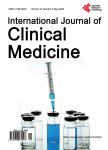Clinical Study on Autosomal Dominant Polycystic Kidney Disease among South Indians
Clinical Study on Autosomal Dominant Polycystic Kidney Disease among South Indians作者机构:PG & Research Department of Zoology & Biotechnology Lady Doak College Madurai India
出 版 物:《International Journal of Clinical Medicine》 (临床医学国际期刊(英文))
年 卷 期:2013年第4卷第4期
页 面:200-204页
主 题:Polycystic Kidney Disease Hyponatremia Renal Osteodystrophy Anemia
摘 要:Autosomal dominant polycystic kidney disease (ADPKD) is a commonly inherited disorder in humans, with a frequency of 1 in 100 in the general population. ADPKD is caused by mutations in PKD1 gene (85%) located on human chromosome 16p13.3;Mutations in the PKD2 gene contribute to 15% of ADPKD incidence and is located on human chromosome 4q2-23. A total of hundred ADPKD patients and age and sex matched healthy individuals were selected for the study. The study was aimed to evaluate the prevalence of ADPKD, lipid profile and level of calcium (Ca), sodium (Na), iron (Fe) and potassium (K) in patients with ADPKD and in healthy individuals. The lipid profile was analyzed using commercially available span kit and semiautoanalyzer (Erba, Chem 5X). The Ca, Na, Fe and K concentrations were estimated by flame photometry (ELICO, CL 22D) and atomic absorption spectroscopy (ELICO, SL 173) and significant changes were noted at p 0.05. The ADPKD patients were observed to have lipid abnormalities, hyponatremia, cholesterolemia, renal osteodystrophy, cardiovascular problems and anemia. Therefore, the study reveals an association between the lipid profile and Ca, Na, Fe and K levels with ADPKD among South Indian population.



